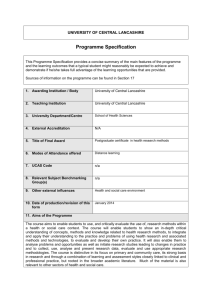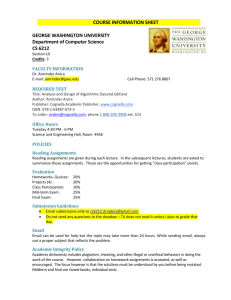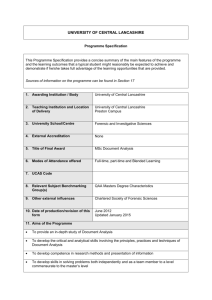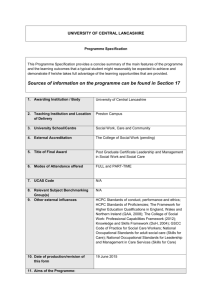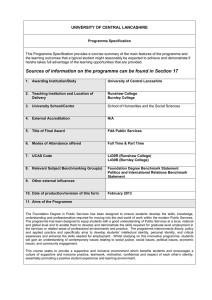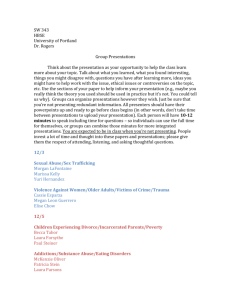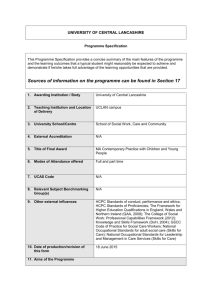Programme Specification - University of Central Lancashire
advertisement
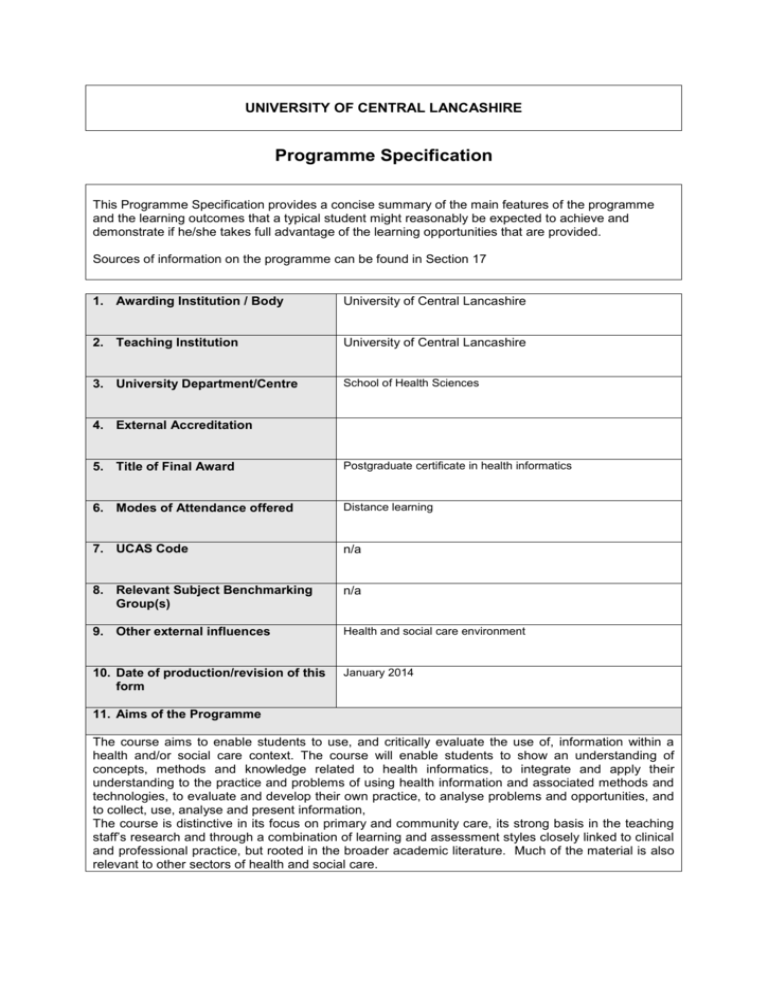
UNIVERSITY OF CENTRAL LANCASHIRE Programme Specification This Programme Specification provides a concise summary of the main features of the programme and the learning outcomes that a typical student might reasonably be expected to achieve and demonstrate if he/she takes full advantage of the learning opportunities that are provided. Sources of information on the programme can be found in Section 17 1. Awarding Institution / Body University of Central Lancashire 2. Teaching Institution University of Central Lancashire 3. University Department/Centre School of Health Sciences 4. External Accreditation 5. Title of Final Award Postgraduate certificate in health informatics 6. Modes of Attendance offered Distance learning 7. UCAS Code n/a 8. Relevant Subject Benchmarking Group(s) n/a 9. Other external influences Health and social care environment 10. Date of production/revision of this form January 2014 11. Aims of the Programme The course aims to enable students to use, and critically evaluate the use of, information within a health and/or social care context. The course will enable students to show an understanding of concepts, methods and knowledge related to health informatics, to integrate and apply their understanding to the practice and problems of using health information and associated methods and technologies, to evaluate and develop their own practice, to analyse problems and opportunities, and to collect, use, analyse and present information, The course is distinctive in its focus on primary and community care, its strong basis in the teaching staff’s research and through a combination of learning and assessment styles closely linked to clinical and professional practice, but rooted in the broader academic literature. Much of the material is also relevant to other sectors of health and social care. 12. Learning Outcomes, Teaching, Learning and Assessment Methods A. Knowledge and Understanding A1. To demonstrate knowledge of the role of information, information management and technology within health and social care A2. To demonstrate an appreciation of the political and professional context of health and social care A3. To demonstrate knowledge of the role of IM&T within health and social care including the related strategy documents such as coding, and information governance. Teaching and Learning Methods eLearning Online seminars, workshops and tutorials, directed reading, group and individual projects and presentations Assessment methods Written assignments, practical assignments, presentations B. Subject-specific skills B1 To be able to apply advanced IT skills including data modelling, B2. To demonstrate an understanding of the need for, and the correct application of the coding of health and social care information B3. To be able to be develop an information strategy. Teaching and Learning Methods eLearning Online seminars, workshops and tutorials, directed reading, group and individual projects and presentations Assessment methods Written assignments, practical assignments, presentations C. Thinking Skills C1. To demonstrate knowledge of computer concepts for the health and social care professional C2. To relate health informatics and quality assurance to the broader literature C3. To be able to evaluate new technologies Teaching and Learning Methods eLearning Online seminars, workshops and tutorials, directed reading, group and individual projects and presentations Assessment methods Written assignments, practical assignments, presentations and reflective learning diary D. Other skills relevant to employability and personal development D1. To demonstrate development of enhanced IT skills: word processing, electronic searching D2. To carry out research from a wide range of paper and electronic sources. D3. To demonstrate communication skills in a variety of media and formats e.g. presentation skills, report writing D4. To demonstrate the ability to work in a team or independently. D5. To manage projects and their own time Teaching and Learning Methods Online seminars, workshops and tutorials, directed reading, group and individual projects and presentations These skills are taught in HI4000 and then applied in all modules in both formative and summative assessments. Assessment methods Written assignments, presentations, portfolio of evidence 13. Programme Structures Level 7 14. Awards and Credits Module Code HI4000 Module Title HI4001 Information and IT concepts for health and social care (Comp ) 20 HI4002 Quantitative methodology for health and social research (O) 20 HI4003 Qualitative research methods for health and social research (O) 20 HI4004 Informatics for Health and social health care (O) Postgraduate and professional study skills (Comp ) Credit rating 20 Postgraduate certificate requires 60 credits at level 7. 20 15. Personal Development Planning PDP is taught in HI4000 and then applied in all modules in both formative and summative assessments. Students are encouraged to register with UKCHIP which has a CPD scheme. 16. Admissions criteria Programme Specifications include minimum entry requirements, including academic qualifications, together with appropriate experience and skills required for entry to study. These criteria may be expressed as a range rather than a specific grade. Amendments to entry requirements may have been made after these documents were published and you should consult the University’s website for the most up to date information. Students will be informed of their personal minimum entry criteria in their offer letter. To come on the programme, students will normally be expected to hold a relevant 2nd class honours degree or equivalent, or a professional qualification with relevant experience. They will normally be an working within health or social care. It is necessary to be working in a suitable environment to carry out the learning and assessment. However, if applicants are interested in the programme and this is a barrier they are encouraged to contact the programme team. Likewise If applicants are working in a health or social care environment, but do not meet the standard academic conditions, they may also be admitted on the basis of substantial relevant experience. Such applicants will be asked to show ability to benefit from the programme. However, it is considered important not to restrict entry unnecessarily in view of the broad range of skills and experience relevant to the area of study. Applicants who do not meet some of the entry criteria will be advised on how to progress their learning to an appropriate stage for entry. All candidates will need basic IT skills to access the programme. 17. Key sources of information about the programme Fact Sheet Website Course Enquiries Course Leader 18. Curriculum Skills Map Level Module Code HI4000 HI4001 7 HI4002 Module Title Postgraduate and professional study skills Information and IT concepts for health and social care Quantitative methodology for health and social research Compulsory (COMP), Core (C) or Option (O) Knowledge and understanding A1 A2 A3 COMP √ √ √ COMP √ √ O √ HI4003 Qualitative research methods for health and social research O √ HI4004 Informatics for health and social care O √ √ Subjectspecific Skills B1 Thinking Skills Other skills relevant to employability and personal development B2 B3 C1 C2 C3 C4 D1 D2 D3 D4 D5 √ √ √ √ √ √ √ √ √ √ √ √ √ √ √ √ √ √ √ √ √ √ √ √ √ √ √ √ √ √ √ √ √ √ √ √ √ √ √ √ √ √ √ √ √ √ √ √ √ √
